Warning Expands to All of Serbia
- Share via
Europe
The Balkans: The threat of NATO airstrikes in Serbia’s Kosovo province lessened in recent weeks, but tension remained high in the region, and the State Department expanded its Kosovo travel warning to include all of Serbia and Montenegro. Dependents and nonemergency diplomatic personnel at the U.S. Embassy in Belgrade were ordered out of the country, and all other Americans were strongly urged to leave. Britain, France, Germany, Norway and Denmark also advised their citizens to leave Serbia and Montenegro, the two provinces that make up what is left of the former Yugoslavia.
U.S. diplomats in Croatia were ordered to be careful when traveling near the border of Serbia or Bosnia-Herzegovina, and nonofficial Americans were advised to show similar caution.
Turkey: A bus carrying 38 British tourists collided with a taxi near Izmir last week, killing at least six people and injuring 35.
The State Department notes that driving in Turkey can pose “unique” challenges, and it has taken the unusual step of posting a “driver safety briefing” for visitors to that country. Among the points:
* Drive very defensively and avoid driving at night.
* Use your horn to get pedestrians’ attention. Use both horn and lights to get other drivers’ attention.
* Expect the unexpected. Many accidents occur when a local driver stops, turns or takes an action that is unexpected by U.S. standards.
* Outside the cities, dusk is particularly dangerous because most drivers delay turning on their headlights until well after dark.
* Trucks and buses may take the right of way without signaling, whether or not they are entitled to.
* Almost half the total vehicle accidents in Turkey are in Ankara and Istanbul provinces. In highly congested Istanbul, most traffic-related deaths are pedestrians.
South America
Ecuador: The Guagua Pichinchua volcano could erupt between now and mid-December, according to the U.S. Embassy in Quito. Geological experts have noticed a significant increase in tremors and steam emissions from the volcano, located seven miles west of the capital. Another mountain shelters Quito from possible lava flows and avalanches, but the city of 1.4 million could be affected by volcanic ash and its water supply could be interrupted.
Meanwhile, the U.S. Embassy advises that demonstrations over the economy are possible through the rest of this month in Quito and several other Ecuadorean cities. Past demonstrations have been marked by burning tires, gasoline bombs and occasional gunfire, and police have responded with tear gas.
Briefly . . .
Israel: Dozens of people were wounded last week when a Palestinian detonated two hand grenades at a crowded bus station in the southern Israeli town of Beersheba. American travelers have often been warned against using public buses in Israel or waiting at bus stops. . . . Jamaica: Police and soldiers patrolled the streets of downtown Kingston after three days of clashes that left three people dead. The violence began when a community leader was arrested and rumors--which proved to be untrue--spread that he had been shot by police. . . . Malaysia: Some demonstrations in Kuala Lumpur have turned violent recently, and the U.S. Embassy advises Americans to avoid public gatherings. . . . Honduras: In response to street violence, the president has ordered the armed forces to help police patrol the cities. Since 1994, 22,000 people have been victims of violent crime and 10,000 have been killed in the country of 5 million people, and police estimate that 80% of Hondurans illegally carry firearms. . . . Saudi Arabia: The American diplomatic and business communities in Saudi Arabia were warned this month that terrorists may be planning an attack on the U.S. Embassy in Riyadh.
Hot spots: Citing political unrest in the capital, the State Department has added the southern African nation of Lesotho to its list of places considered dangerous for Americans. Others on the travel warning list are Afghanistan, Albania, Algeria, Angola, Bosnia-Herzegovina, Burundi, Cambodia, Central African Republic, Colombia, Congo (formerly Zaire), Eritrea, Guinea-Bissau, Iran, Iraq, Lebanon, Liberia, Libya, Montserrat, Nigeria, Pakistan, Republic of Congo (Brazzaville), Rwanda, Serbia and Montenegro, Sierra Leone, Somalia, Sudan and Tajikistan.
The U.S. State Department offers recorded travel warnings and advisories at (202) 647-5225; the fax line is (202) 647-3000. Internet address is https://travel.state.gov.
More to Read
Sign up for Essential California
The most important California stories and recommendations in your inbox every morning.
You may occasionally receive promotional content from the Los Angeles Times.













